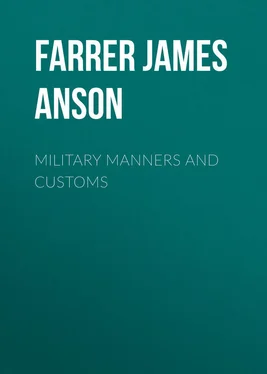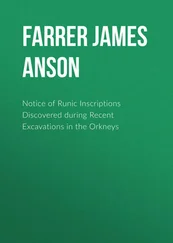James Farrer - Military Manners and Customs
Здесь есть возможность читать онлайн «James Farrer - Military Manners and Customs» — ознакомительный отрывок электронной книги совершенно бесплатно, а после прочтения отрывка купить полную версию. В некоторых случаях можно слушать аудио, скачать через торрент в формате fb2 и присутствует краткое содержание. Жанр: foreign_antique, foreign_prose, на английском языке. Описание произведения, (предисловие) а так же отзывы посетителей доступны на портале библиотеки ЛибКат.
- Название:Military Manners and Customs
- Автор:
- Жанр:
- Год:неизвестен
- ISBN:нет данных
- Рейтинг книги:5 / 5. Голосов: 1
-
Избранное:Добавить в избранное
- Отзывы:
-
Ваша оценка:
- 100
- 1
- 2
- 3
- 4
- 5
Military Manners and Customs: краткое содержание, описание и аннотация
Предлагаем к чтению аннотацию, описание, краткое содержание или предисловие (зависит от того, что написал сам автор книги «Military Manners and Customs»). Если вы не нашли необходимую информацию о книге — напишите в комментариях, мы постараемся отыскать её.
Military Manners and Customs — читать онлайн ознакомительный отрывок
Ниже представлен текст книги, разбитый по страницам. Система сохранения места последней прочитанной страницы, позволяет с удобством читать онлайн бесплатно книгу «Military Manners and Customs», без необходимости каждый раз заново искать на чём Вы остановились. Поставьте закладку, и сможете в любой момент перейти на страницу, на которой закончили чтение.
Интервал:
Закладка:
This remark applies even to battles like Crecy or Agincourt, where the numbers slain were unusually high, and where they are said to have been accurately ascertained by counting after the victory. When Froissart on such authority quotes 1,291 as the total number of warriors of knightly or higher rank slain at Crecy, it is possible of course that he is not the victim of deception; but what of the 30,000 common soldiers for whose death he also vouches? A monk of St. Albans, also a contemporary, speaks only of an unknown number ( et vulgus cujus numerus ignoratur ); which in the account of the Abbot Hugo was put definitely at more than 100,000. It is evident from this that the greatest laxity prevailed in reference to chronicling the numbers of the slain; so that if we take 3,000 instead of 30,000 as the sum total of common soldiers slain at Crecy, it is probable that we shall be nearer the truth than if we implicitly accept Froissart’s statement.
The same scepticism will of course hold good of the battles of the ancient world. Is it likely, for instance, that in a battle in which the Romans are said only to have lost 100 men, the Macedonians should have lost 20,000? 10 10 Livy, xliv. 42.
Or again, is it possible, considering the difficulty of the commissariat of a large army, even in our own days of trains and telegraphs and improved agriculture, that Marius in one battle can have slain 200,000 Teutons, and taken 90,000 prisoners? But whilst no conclusion is possible but that the figures of the older histories are altogether too untrustworthy to afford any basis for comparison, the calculation rests on something more like fair evidence, that in the fortnight between August 4, 1870, the date of the battle of Wissembourg, and August 18, that of Gravelotte, including the battles of Woerth and Forbach on August 6, of Courcelles on the 14th, and of Vionville on the 16th more than 100,000 French and Germans met their death on the battle-field, to say nothing of those who perished afterwards in agonies in the hospitals. Recent wars have been undoubtedly shorter than they often were in olden times, but their brevity is founded on no reason that can ensure its recurrence: nor, if 100,000 are to be miserably cast out of existence, is the gain so very great, if the task, instead of being spread over a number of years, requires only a fortnight for its accomplishment.
For the nearest approach to a statement of what the laws of war in our own time really are, we must turn to the Brussels Conference, which met in 1874 at the summons of the same great Russian to whom the world owes the St. Petersburg Declaration, and which constituted a genuine attempt to mitigate the evils of war by an international agreement and definition of their limits. The idea of such a plan was originally suggested by the Instructions published in 1863 by President Lincoln for the government of the armies of the United States in the civil war. 11 11 These Instructions are published in Halleck’s International Law , ii. 36-51; and at the end of Edwards’s Germans in France .
The project for such an international agreement, originally submitted by the Russian Government for discussion, was very much modified before even a compromise of opinion could be arrived at on the several points it contained. And the project so modified, as a preliminary basis for future agreement, owing to the timid refusal of the English Government to take further part in the matter, never, unfortunately, reached its final stage of a definite code; 12 12 ‘It would have been desirable,’ said the Russian Government, ‘that the voice of a great nation like England should have been heard at an inquiry of which the object would appear to have met with its sympathies.’
but it remains nevertheless the most authoritative utterance extant of the laws generally thought to be binding in modern warfare on the practices and passions of the combatants. The following articles from the project as finally modified are undoubtedly the most important: —
Art. 12. The laws of war do not allow to belligerents an unlimited power as to the choice of means of injuring the enemy.
Art. 13. According to this principle are strictly forbidden —
a. The use of poison or poisoned weapons.
b. Murder by treachery of individuals belonging to the hostile nation or army.
c. Murder of an antagonist who, having laid down his arms, or having no longer the means of defending himself, has surrendered at discretion.
d. The declaration that no quarter will be given.
e. The use of arms, projectiles, or substances which may cause unnecessary suffering, as well as of those prohibited by the Declaration of St. Petersburg in 1868.
f. Abuse of the flag of truce, the national flag, or the military insignia or uniform of the enemy, as well as the distinctive badges of the Geneva Convention.
g. All destruction or seizure of the enemy’s property which is not imperatively required by the necessity of war.
Art. 15. Fortified places are alone liable to be besieged. Towns, agglomerations of houses or villages which are open or undefended, cannot be attacked or bombarded.
Art. 17. … All necessary steps should be taken to spare as far as possible buildings devoted to religion, arts, sciences, and charity, hospitals and places where sick and wounded are collected, on condition that they are not used at the same time for military purposes.
Art. 18. A town taken by storm shall not be given up to the victorious troops for plunder.
Art. 23. Prisoners of war … should be treated with humanity… All their personal effects except their arms are to be considered their own property.
Arts. 36, 37. The population of an occupied territory cannot be compelled to take part in military operations against their own country, nor to swear allegiance to the enemy’s power.
Art. 38. The honour and rights of the family, the life and property of individuals, as well as their religious convictions and the exercise of their religion, should be respected.
Private property cannot be confiscated.
Art. 39. Pillage is expressly forbidden.
There is at first sight a pleasing ring of humanity in all this, though, as yet, it only represents the better military spirit, which is always far in advance of actual military practice. In the monotonous history of war there are always commanders who wage it with less ferocity than others, and writers who plead for the mitigation of its cruelties. As in modern history a Marlborough, a Wellington, or a Villars forms a pleasant contrast to a Feuquières, a Belleisle, or a Blücher, so in ancient history a Marcellus or a Lucullus helps us to forget a Marius or an Alexander; and the sentiments of a Cicero or Tacitus were as far in advance of their time as those of a Grotius or Vattel were of theirs. According to the accident of the existence of such men, the laws of war fluctuate from age to age; but, the question arises, Do they become perceptibly milder? do they ever permanently improve?
It will be said that they do, because it will be said that they have; and that the annals of modern wars present nothing to resemble the atrocities that may be collected from ancient or mediæval history. Yet such statements carry no conviction. Deterioration seems as likely as improvement; and unless the custom is checked altogether, the wars of the twentieth century may be expected to exceed in barbarity anything of which we have any conception. A very brief inquiry will suffice to dispel the common assurances of improvement and progress.
Poison is forbidden in war, says the Berlin Conference; but so it always was, even in the Institutes of Menu, and with perhaps less difference of opinion in ancient than in modern times. Grotius and Vattel and most of their followers disallow it, but two publicists of grave authority defend it, Bynkershoeck and Wolff. The latter published his ‘Jus Gentium’ as late as 1749, and his argument is worth translating, since it can only be met by arguments which equally apply to other modes of military slaughter. ‘Naturally it is lawful to kill an enemy by poison; for as long as he is our enemy, he resists the reparation of our right, so that we may exercise against his person whatever suffices to avert his power from ourselves or our possessions. Therefore it is not unfair to get rid of him. But, since it comes to the same thing whether you get rid of him by the sword or by poison (which is self-evident, because in either case you get rid of him, and he can no longer resist or injure you), it is naturally lawful to kill an enemy by poison.’ And so, he argues with equal force, of poisoned weapons. 13 13 Jus Gentium, art. 887, 878.
That poison is not in use in our day we do not therefore owe to our international lawyers, but to the accident of tradition. In Roman history the theory appears to have been unanimous against it. ‘Such conduct,’ says the Roman writer Florus of a general who poisoned some springs in order to bring some cities in Asia to a speedier surrender, ‘although it hastened his victory, rendered it infamous, since it was done not only against divine law, but against ancestral customs.’ 14 14 Florus, ii. 20.
Our statesman Fox refused indignantly to avail himself of an offer to poison Napoleon, but so did the Roman consuls refuse a similar proposal with regard to Pyrrhus; and Tiberius and the Roman senate replied to a plan for poisoning Arminius, that the Roman people punished their enemies not by fraud or in secret, but openly and in arms
Интервал:
Закладка:
Похожие книги на «Military Manners and Customs»
Представляем Вашему вниманию похожие книги на «Military Manners and Customs» списком для выбора. Мы отобрали схожую по названию и смыслу литературу в надежде предоставить читателям больше вариантов отыскать новые, интересные, ещё непрочитанные произведения.
Обсуждение, отзывы о книге «Military Manners and Customs» и просто собственные мнения читателей. Оставьте ваши комментарии, напишите, что Вы думаете о произведении, его смысле или главных героях. Укажите что конкретно понравилось, а что нет, и почему Вы так считаете.












